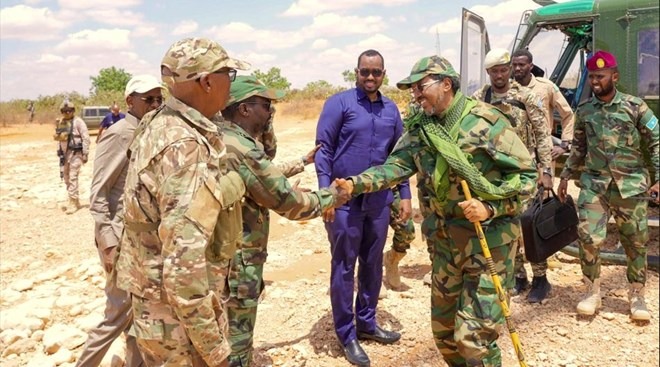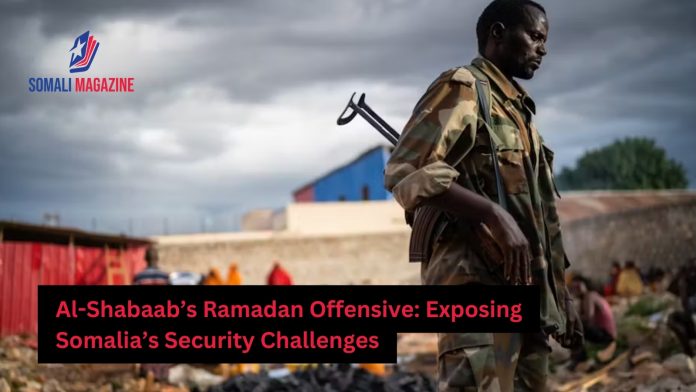Facebook Twitter Instagram Somali Magazine - People's Magazine
Al-Shabaab’s ongoing Ramadan offensive has exposed critical gaps in Somalia’s security framework, raising concerns about the militant group’s resilience and the government’s ability to maintain control over key regions. The large-scale operation, which began in February 2025, has seen over 3,000 militants mobilized to retake strategic areas in central and southern Somalia, including the Middle Shabelle region. Despite facing significant resistance from Somali forces and their international allies, Al-Shabaab has demonstrated its capacity to launch coordinated and deadly attacks.
One of the most audacious incidents occurred on March 18, when Al-Shabaab targeted Somali President Hassan Sheikh Mohamud’s convoy with a powerful roadside bomb near Mogadishu airport. While the president escaped unharmed, the attack claimed the lives of four individuals, underscoring the group’s ability to strike high-profile targets. Days earlier, militants launched assaults on Somali military positions in Awdhiigle and Hawo Abdi, areas alarmingly close to Mogadishu’s administrative boundaries. Although government forces repelled these attacks, Al-Shabaab claimed to have inflicted heavy casualties, reportedly killing at least 30 soldiers.
The group’s strategy during Ramadan has included targeting economic corridors and previously cleared zones. Al-Shabaab briefly overran the Bal’ad district, releasing imprisoned fighters and signaling its intent to reconnect fragmented strongholds. The militants have also focused on regaining control of the highway linking Mogadishu to Ethiopia through Middle Shabelle and Hiraan, a critical economic lifeline. Control of this route allows Al-Shabaab to impose lucrative taxes on local entities, further bolstering its financial resources.
Local clan tensions and political divisions have further complicated the security situation. Disputes among the Hawiye clans in Middle Shabelle over resource sharing and political representation have created vulnerabilities that Al-Shabaab has exploited. These divisions have been particularly pronounced during Ramadan, providing the militants with opportunities to strengthen their foothold in contested areas.
The offensive has also highlighted the group’s ability to adapt and innovate. In a sophisticated attack on March 11, Al-Shabaab targeted prominent local elders in a hotel siege in Beledweyne, marking their most significant assault in the Hiraan capital since 2022. The group’s ability to infiltrate and briefly occupy neighborhoods on Mogadishu’s outskirts has raised alarm about the effectiveness of local security measures.

The Somali government, led by President Mohamud, has vowed to intensify its military campaign against Al-Shabaab. Prime Minister Hamse Abdi Barre recently announced plans for a major operation during Ramadan, calling on clans, scholars, and intellectuals to support the government’s efforts. However, the offensive has underscored the need for sustained international support and a comprehensive approach to counterterrorism that addresses the root causes of extremism.
International partners, including the United States, the African Union Transition Mission in Somalia (ATMIS), and neighboring countries, have provided critical support in the fight against Al-Shabaab. However, the group’s continued resilience highlights the challenges of maintaining long-term security in a region plagued by political instability and economic hardship.
As Somalia grapples with the implications of Al-Shabaab’s Ramadan offensive, the focus remains on strengthening its security forces, fostering political unity, and addressing the socio-economic factors that fuel extremism. The offensive serves as a stark reminder of the ongoing threat posed by Al-Shabaab and the need for a coordinated and sustained response to ensure lasting peace and stability.

